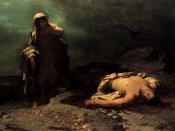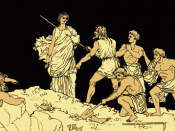In the Greek tragedy Antigone, contempt of death, honor, and virtue enables the young heroine Antigone to conquer a powerful ruler Creon, who, proud of his ignorance, turns his back to the people of Thebes, his son, and divine law. Creon learns all too late, from the destruction of his family, that Fate in due course brings him the punishment he deserves for his fit of outrage. In Antigone, God's judgment of man plays an essential role in the battle between human and divine law. Although Creon sends Antigone to be murdered because she violates the state's law against burying her brother Polynices, God's justice proves to be much more powerful at the conclusion of the play.
To understand Antigone, it is important to know some basic beliefs of the ancient Greek people. For the Greeks, law was often held as highly as religion. The ancient codes of the cities were a collection of rites, liturgical directions, and prayers, joined with legislative regulations (Davies).
Rules for sacrifices, burial, and worship of the dead were among the most important. When a corpse was not buried, and left uncovered to be eaten by birds and animals, the gods were enraged because this was thought to be an indignity to the body's family. Antigone feels it is necessary to bury the body of her brother, who is a traitor to Thebes, but her blood nonetheless. Antigone presents her beliefs when she proclaims, "...Nor did I think your edict had such force that you, a mere mortal, could override the gods, the great unwritten, unshakable traditions...These laws--I was not about to break them, not out of fear of some man's wounded pride, and face the retribution of the gods"� (82, ln 503-11). Ancient Greeks had much respect and attachment for their...


